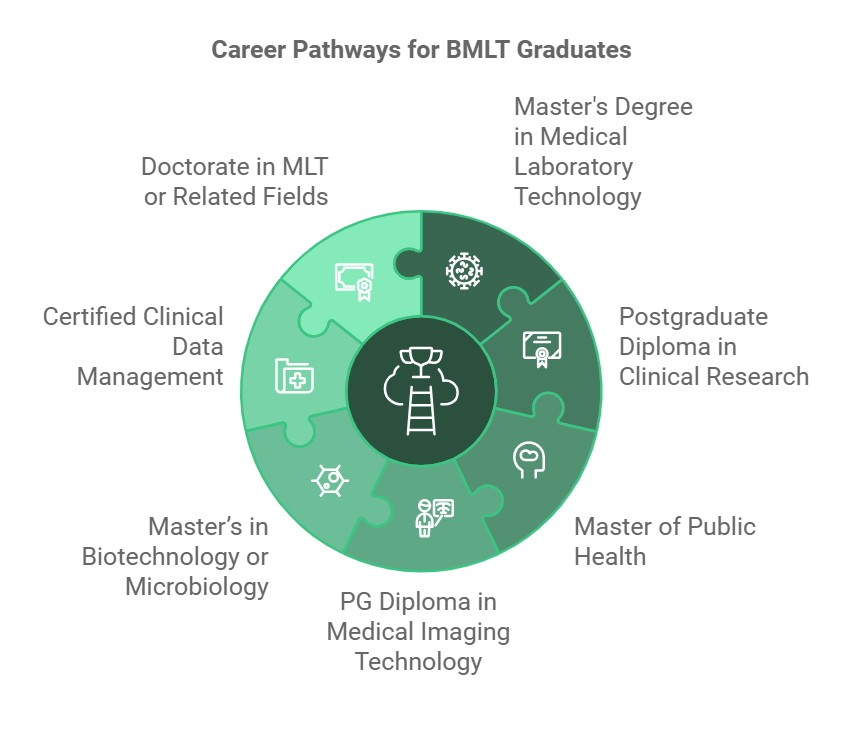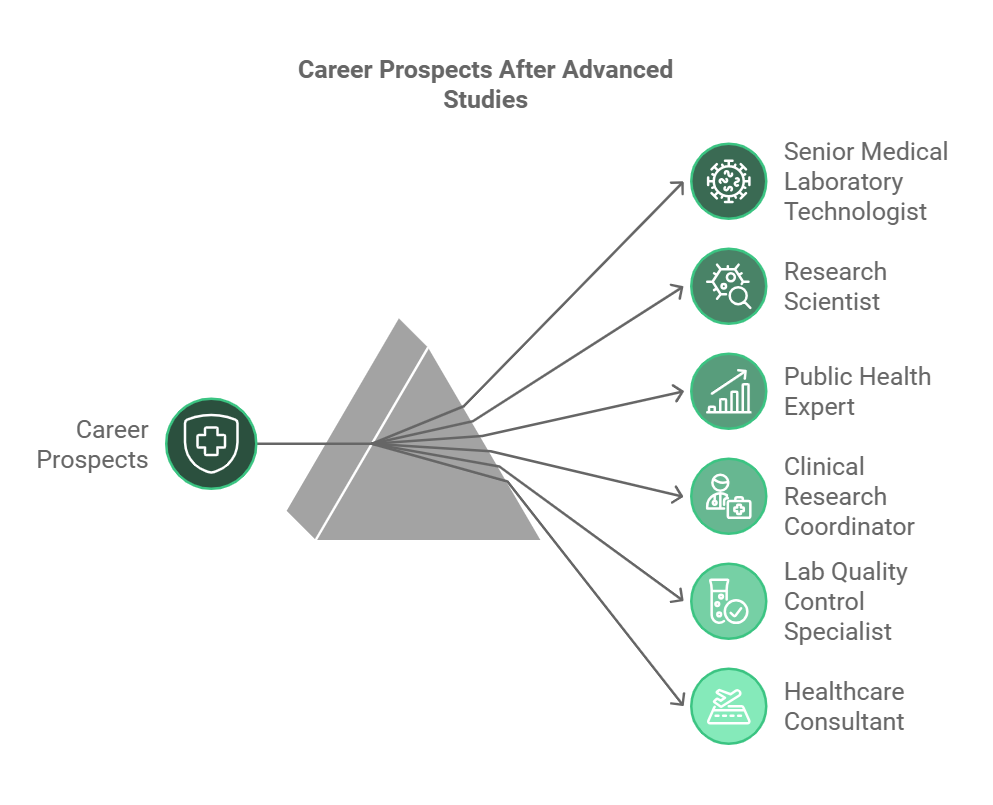
The healthcare sector is ever-evolving and offers all of those professionals who are looking to improve their skills and training.
For students graduating with a Bachelor in Medical Laboratory Technology (BMLT) degree from institutions such as KIIMS Dehradun, which are known for innovative, interconnected learning environments, the journey towards productive work does not end at graduation.
Currently it is not used for focused learning but as a platform to a lot of specific courses and career preparation credits.
In this blog, we will explore and discuss the most suitable courses to be taken after the BMLT, its advantages and how they can lead to the development of future career.
Why Consider Further Studies After BMLT?
A Bachelor of Medical Laboratory Technology (BMLT) provides graduates with basic practical skills in diagnostic testing and laboratory skills.
Yet, the ever-changing healthcare sector rapidly advocates for higher level or specialized expertise and skills.
Here’s why continuing education post BMLT might be a career game-changer:

1. Specialization
Specialization in particular areas such as microbiology, hematology, biochemistry, or pathology is possible by means of advanced studies for BMLT graduates.
Specialization not only deepens your knowledge, but also places you in a high-demand industry as an expert.
2. Career Growth
Higher education provides pathways to positions in leadership and to at a higher clinical tier of practice, leading to improved career opportunities and substantially higher pay scales.
Career opportunities such as Clinical Lab Manager, Quality Assurance Analyst, or Research Scientist are achieved.
3. Research Opportunities
Subsequent study frequently combines research components, and opens opportunities for access to academic or industry research studies. These opportunities contribute to medical science advancement as well as enhancing your professional standing.
4. Global Opportunities
When it comes to several international health care organizations, postgraduate study or endorsement is often a necessary requirement. Continuing their education means that students become eligible to pursue career opportunities in the global job market, thus broadening their career scope from domestic markets.
Which Courses is Best After BMLT in 2025?

Here’s a comprehensive list of courses suited for BMLT graduates, categorized based on career goals:
1. Master’s Degree in Medical Laboratory Technology (M.Sc MLT)
- Overview: A natural progression for BMLT graduates, this course delves deeper into laboratory techniques and research.
- Duration: 2 years.
- Specializations:
- Clinical Biochemistry
- Microbiology
- Hematology
- Molecular Biology
- Career Prospects: Laboratory manager, research scientist, or senior technologist.
2. Postgraduate Diploma in Clinical Research
- Overview: Focuses on the methodologies and ethical guidelines of clinical trials.
- Duration: 1 year.
- Benefits:
- High demand in pharmaceutical companies and hospitals.
- Entry into roles like Clinical Research Associate or Clinical Trial Manager.
3. Master of Public Health (MPH)
- Overview: A broader field focusing on public health policies, epidemiology, and health management.
- Duration: 2 years.
- Career Opportunities: Public health analyst, epidemiologist, or health program manager.
4. PG Diploma in Medical Imaging Technology
- Overview: Ideal for those interested in diagnostic imaging such as X-rays, MRIs, and CT scans.
- Duration: 1 year.
- Future Roles: Medical imaging technologist or radiographer.
5. Master’s in Biotechnology or Microbiology
- Overview: Suited for those interested in biological sciences and laboratory research.
- Duration: 2 years.
- Advantages:
- Opens opportunities in pharmaceutical and research industries.
- Potential for academic or industrial research roles.
6. Certified Clinical Data Management (CDM)
- Overview: Focuses on managing clinical trial data, crucial for the pharmaceutical and biotech industries.
- Duration: 6–12 months.
- Career Path: Clinical data manager or medical coder.
7. Doctorate (Ph.D.) in MLT or Related Fields
- Overview: The ultimate academic qualification, leading to expertise in a niche area.
- Duration: 3–5 years.
- Best For: Those aspiring to become researchers or academicians.
Short-Term Certification Courses
If you want to enter the workforce quickly while enhancing your skill set, consider short-term certification programs. These can include:
- Quality Control and Assurance in Laboratories
- Advanced Laboratory Techniques
- Molecular Diagnostics
- Infection Prevention and Control
- Medical Coding and Billing
These courses are typically a few months long and can immediately boost your employability.
How to Choose the Right Course?
Selecting the right course after graduating as a Bachelor of Medical Laboratory Technology (BMLT) holder is a very important step that determines the flow of career. To make an informed choice, consider these key factors:
1. Your Interest
Consider the topics or subject(s) that you found to be the most interesting part of your BMLT program. No matter whether your interest lies in microbiology, pathology or medical imaging, passion should direct your choice, as authentic interest is what will drive engagement and ultimately success.
2. Industry Demand
Analyze market trends to identify in-demand specializations. Especially fields of molecular diagnostics, immunology and biostatistics are rapidly expanding with a lot of promising career opportunities. Choose courses based on the knowledge and expertise gained in fields that show strong future employment prospects.
3. Financial Investment
Assess the fee of the course, e.g., tuition, materials, and extras. Consider this against expected return on investment (ROI) of job creation and salary opportunities. Scholarships, financial assistance and part-time employment options can make a difference to the cost situation.
4. Long-Term Goals
Describe your career goals and confirm that the course is applicable to those goals. However, for those who seek leadership positions, research or exposure to global opportunities, consider advanced training such as a Master’s in Medical Laboratory Technology (MMLT) or a certificate in a specialized field.
5. Location and Accessibility
There may be certain courses which involve a change of location or attendance at institutions with particular resource or facility types. Think about if the course is offered online, in-person, or hybrid and whether the delivery site meets your needs and schedule.
Career Prospects After Advanced Studies

Continuing the development of expertise through further qualification after completion of a BMLT degree makes opportunities for a wide range of employment options in the healthcare and research sectors. Here are some prominent roles you can explore:
1. Senior Medical Laboratory Technologist
Conduct diagnostic operations leadership in high complexity laboratories, manage junior staff, and guarantee correct testing and reporting.
2. Research Scientist
Engage in cutting-edge research to implement novel diagnostic methods, therapeutic approaches, or technologies in laboratory medicine.
3. Public Health Expert
Contribute to community-wide improvements in health through disease prevention strategies, epidemiology studies, and public health outreach campaigns.
4. Clinical Research Coordinator
Supervise clinical trials and other research studies, monitoring adherence to protocols and ethical guidelines, and handling participant data.
5. Lab Quality Control Specialist
Laboratories should be equipped with the standard and testing procedures that comply with regulatory guidelines, while ensuring quality assurance in medical lab testing.
6. Healthcare Consultant
Provide tips to healthcare institutions on operational efficiency, regulatory compliance and laboratory management.
Earning Potential
Salaries for these roles vary based on factors like location, specialization, and experience.
- India: Mid-level roles typically offer salaries ranging from ₹4–10 lakhs per annum.
- Internationally: Salaries and prospects are significantly higher, especially in countries with advanced healthcare systems.
Conclusion
Completing BMLT from KIIMS Dehradun is just the beginning of a promising career in the healthcare sector. By pursuing further studies, you can specialize, climb the professional ladder, and make significant contributions to healthcare and diagnostics.
Whether you aim for a Master’s degree, a diploma, or certification, your next step should align with your aspirations and the evolving demands of the industry. The decision you make today can shape your career for decades to come. Choose wisely and embrace the opportunities that come your way

